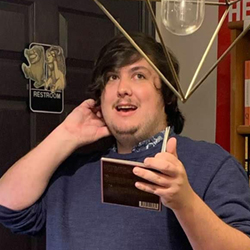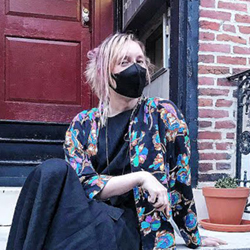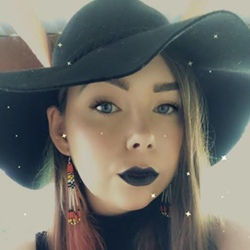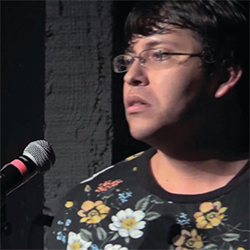|3|2EA|)LA|)Y
When the manuscript first arrived, it seemed like a prank.
It wasn’t immediately apparent that it was a manuscript at all. It appeared on our stoop reeking of dirt and rot. It had no return address, and every page had come from a different source: sheets torn from a legal pad smeared with fetid condiments, lined notebook paper that had been crumpled up and then haphazardly unfolded, letterhead from legal offices where the back was cramped with jagged lines and flecks of ink. But it had hints of purpose, as the front cover’s markings were spaced as if in modern manuscript format. Where I might find ‘about 1,000 words’ in the upper right, I saw loose scratches surrounding two-stroke circles, which vaguely resembled zeroes.
It wasn’t unusual for a journal like ours to receive awful submissions: works so rote they seemed machine-written, works that lacked the awareness to even achieve roteness, and the occasional incomprehensible word-spew. I had grown accustomed to dropping such things in the recycling before writing a neutral thanks-but-no-thanks letter to the author, but I had never seen anything like this.
Because it stank, I threw it in the dumpster behind our building. On a telephone wire above me, just outside my second floor office, a trio of crows began to bark loudly as I walked away. Crows love trash, so, I didn’t think about it.
When another such mess arrived the next month, I wondered if we had a stalker. Nobody in the office reported anyone following them, though Hilda joked about an ass of an ex who she called, “About as eloquent and aromatic as that!” So I threw it out again and got back to reading the usual tripe, but the worry that those indecipherable texts put in me outdid anything else we received that month. As a horror journal, most of our submissions came down to personal anxieties that authors externalized, distinguished primarily by craftsmanship. We would laugh, “What’s that staring up from the bottom of the stairs? Lurking at the edge of the forest? Stomping about the neglected attic? Why, it’s a Jungian archetype!”
It was the third manuscript that I first tried to read. Relative to the previous two, some of the marks on this one had become legible. I could make out ‘A’, ‘N’, and other block letters, though the author clearly had trouble writing circular characters like ‘b’ and ‘d’, so much so that I still couldn’t discern full words. I decided to keep this one, and zipped it in a plastic bag to contain the smell.
The fourth arrived later than the others, a couple weeks after a month had passed. In that time, I worried the mystery would end unsolved. When it showed up on the stoop, I sighed in relief before retching at the scent. This time I could make out enough words to get the gist of at least some of the sentences. They concerned people fighting over treetops, arguing about bugs, and learning to fly. I wondered then if the author were someone who our sham of an educational system had failed to make literate, but who nevertheless wanted to write so badly that they scrounged for whatever paper they could and emulated literature upon it. Learning to fly was a not uncommon coming-of-age metaphor, which indicated a narrative awareness that struck me as promising. I imagined someone grungy and shy, furiously dreaming of something different, somewhere else.
I still couldn’t read the manuscript end-to-end. The few sentences I could understand were far and few between, so I stuffed it in a bag and placed it in the drawer where the second one had remained.
By the time the fifth arrived, through a combination of improved penmanship and my own adjusting to the script, I managed to put the whole story together. For a couple of hours I sat at my office chair and read it, turning page after page as I pieced together the chicken-scratch handwriting. The title, I finally understood, was, “Breadlady and the Broken Wing: A Horror Anthology.” Within, five stories ranged from a bird dying of having eaten a poisoned millipede masquerading as a harmless caterpillar, to a bird that broke their wing when they fell from the nest only to become a capable groundling and the menace of many a neighborhood cat. In one story, a human identified as ‘breadlady’ spread a mind-controlling bread that turned birds into bored office workers. Every story centered on birds, crows specifically, and it was as I finished it, when I glanced out my window to reflect on what I had just read, that I saw those three crows from months ago. Maybe they weren’t the same crows, but…
One of them was holding a pen in its beak.
The Ratworm
Do you want to know how magic really works?
You think to yourself that magic isn’t real, or maybe it’s a secret undiscovered. Maybe it’s something we already do, like computers or rocketry or some other mortal fancy. Do you want to know what it really is? It’s so much worse. Sometimes it’s unbearable, like I can never close my eyes, like I can never truly sleep because even in my dreams there I am adrift in the ice floes of some dreadful neverwhere, and always it is calling to me.
You’ve seen hidden orders and schools for wizards in books and movies. You think we take care of our own, keeping our mysterious ways in something like peace and seclusion. You don’t understand what it means to be ground to dust. Ways survive, but most affected remain abandoned in the imperial murk. There the way finds you, and its strangeness comes unbidden.
My childhood was full of ghosts. Someone or something lurked in every closet and crawlspace, in every empty room and darkened window, waiting. I swore I could feel their eyes on me. To describe it as an overactive imagination would underestimate the scope of the sensation. I didn’t understand it. I didn’t understand who I was meeting in my dreams, young people, old people, people I had never known–people I learned were dead. My parents thought it was cute.
“Hey Jimmy,” my dad chuckled to a local grocery clerk. I was six at the time. “My kid says she saw your grandparents in her room.”
We lived in his grandparents’ house. The Sternbeckers had built it themselves from decommissioned ships, and the atypical measure of their beams gave the house a sense of being misshapen, like rooms were at once too large and too small. The old couple appeared in my room and in my dreams regularly, but never maliciously. They sat and watched and smiled, holding hands even after everything.
“Oh really?” Jimmy chuckled, “What did you see?”
“I saw them,” I shrugged. I tried not to think about them as it scared me when I did. “There’s something funny about your grandpa’s right eye, like it’s wet or shiny.”
He blanched. “W-who told you that?”
I shrugged again. My father asked, “What do you mean?”
Jimmy stared at him like this was some kind of bad joke, but he saw no humor in my father’s concerned expression. He leaned in and whispered, “Grandpa Robert lost his eye in the war. Are you sure she’s never seen a photo of him?”
The way Jimmy avoided me after that made me feel like I’d done something wrong. I didn’t want to be seeing ghosts, but they visited me night after night, their translucent bodies phasing through the furniture of my bedroom, their eyes that glowed like dim stars locked onto mine.
But by then I was already a witch. It came with the territory.
I met the witchmothers in my dreams before I knew to be afraid. Three spindly women, one in black rags and veils, one in a drenched white shift, one in a moss-green dress. Their faces were hard to see, as though they were shifting or perhaps altogether blank. Many other children, three-year-olds identical to myself, scampered about the floor of the room, splitting into other selves as they fell, crawled, or wandered, before all of them faded and only I remained.
“Would you like to play?” the woman in black asked, extending a bone-pale hand to me. I took it, not knowing the significance of the act. We walked not two steps before they sat me down for tea. Around us a forest had replaced my room. My stuffed animals were arranged all around a wooden stump dressed in an ivory silk tablecloth, their empty eyes looking nowhere. Old-growths watched over us, thick with fern and vine, and the only light came from the bright moon directly above us.
I felt safe with them. We played hide-and-seek, dress-up, make-believe, and even my toys joined in. Stuffed bears pretended to be kings but I reigned as queen. After a while, the witch in green said my name.
“Joanna.”
Everything froze but the other witches, who gathered around me and blotted out the moon.
“Would you like to be a witch?”
I didn’t know what that meant and I was too scared to ask. A witch? But I had already answered the only real question. Now I was just afraid of the consequences. So I ran.
As soon as I turned around I was back in my house, scrambling down a hallway that stretched out the farther I fled, and behind me they were following me, floating at my pace without otherwise moving, like statues I could not escape.
I found a corner and ducked inside, appearing back in my room again. I hurled myself into the closet and hid under piles of clothing and forgotten moving boxes. Daylight was streaming in the windows and coming under the closet door until their levitating legs obscured it.
“Too late?” one asked. Another replied, “Too late.”
They moved away and only the third remained, until she too admitted, “Too late,” and I awoke.
After that they became fixtures of my nightmares. I would wake up, frozen, and see the woman in rags pointing at me with a burning gaze. In basements and forgotten rooms I would hear the woman in white screaming, and in the deep woods the green witch peered from every tree whenever I was alone. But they weren’t any danger to me. What I learned was far more dangerous were the police who could shoot a disheveled man for speaking gibberish. “Schizophrenia,” was the cause and justification. Local newscasters blithely quoted the officer saying, “I feared for my life,” and that’s all there was to it.
I was across the street, seven years old and holding the hand of my father, leaving a bookstore with a gift for my mother. I knew when I met his dying eyes that the strangeness would kill me, sure as day, sure as it had killed him. After that I stopped telling people about my experiences. To an extent I even stopped believing them myself.
But the strangeness never really leaves. It never lets you go.
I was seventeen when I met the Ratworm. I opted out of high school as much as I could. A cruel society trains cruel people, so I hid in hoodies and avoided them. I spent time alone in the miles of forest and ruin between the school and my house, through which I had traced a rough path that I took to avoid the bullies on the bus. The forest isn’t just trees, of course. It’s underneath the city, breathing and waiting. Every root that cracks a sidewalk is a reminder that it will reclaim all it can, that we persist through a force of will that someday will break. This forest was a facet of that; a limb of something deeper. Rough paths were carved from the hillsides, and elsewhere broken bridges spanned trickling streams. Sometimes a ruined, rusted wreck of a car would glint from the bottom of a ravine dense with brambles. Sometimes you could find the stone foundations of buildings lost to time. Sometimes they disappeared.
It was in that nameless stretch under a golden-crimson canopy that I found a creature, a rat with the hind of a segmented worm, wailing among a patch of an invasive ivy. Where it thrashed the leaves had spoiled and rotted, but I didn’t notice. It was hurt, or looked hurt. I reached out to touch it like a fool, for a fool I was. It sprang upon my hand and bit hard. Everything had frozen. It pulled me down, and it was moving through the ground, despoiling the soil as it descended and dragged me with it. I screamed as damp earth and old roots parted and a void of light and sound rose up to meet me. Then I was in its lair.
It was cold in the nothingness, in the stillness. My eyes and ears strained to detect anything, and eventually I heard the distant crunch of a foot on snow. It was snowing, I saw in a fleeting glimpse, as though I were only seeing one frame of a film. A creature was walking toward me, like a blur in space the size of a person. Bigger than a person. Much bigger. Another frame and I saw it was getting closer. I could feel the ground shake with each of its terrible steps. I couldn’t move. I was numb all over.
“Oh my god,” it said, in a young woman’s voice. A young woman I knew. “Are you hurt?”
Tracy?
As if in response a deep, wet chortle bellowed in my ears, sourceless and enveloping.
“I see what you want, little one,” a cacophony of languages said. I recognized less than a dozen, and there were countless in its depths. “I can give it to you. Will you give me your terror?”
I tried to will myself to move, to struggle and resist this thing’s control as much as I could. But I had already answered the real question. Now I was just afraid of the consequences. The blur, the absence, reached for my face and covered it, smothering me.
I woke up in a cold sweat the next morning, already late for school. But I felt different. I felt… confident. I had a faith in my reasoning that hadn’t been there before. I believed in myself. I felt good about my body. I liked who I saw in the mirror. It was eerie, but I wasn’t about to complain. I even decided to wear a skirt.
On my way to school I tried to find the spot where I had seen the Ratworm, but what had been an expansive patch of ivy had become a steep and ferny slope. At least the invasives were gone. I called it a dream and moved on, no matter how much of the day before I could not remember.
Weeks passed. My grades improved. I even befriended a guy named Terrence. He was big enough to put the fear of God in any gaybasher in town and as warm and kind as a heated blanket. He did put the fear in some, which was how we met. One talked shit, I spat, he spat, I hit him, he hit me, and then Terrence threw him fifteen feet.
“Great form,” I said.
“Thanks. You should see me at the caber toss.”
We bonded during detention. Of course I never told him about the strangeness, but he liked my awful poetry.
Tracy’s name was one of those things that I learned before I knew it. I met her in shop class the next quarter. I didn’t recognize her voice until we were paired for a group project, to produce a metalwork art piece for display together.
“Hi,” she put out her hand, “I’m Tracy.”
I went cold as I realized who she was. “I-I’m Joanna.”
“Good to meetcha,” she said, and shook my hand firmly. Gosh she was tall.
While she welded pipes together in the shape of a log cabin, I wondered what the Ratworm meant by, “what I want.” I hadn’t known Tracy when it confronted me. How could I want anything to do with someone I didn’t know?
“You really want to make Baba Yaga’s house?” I asked.
Beneath her face shield she replied, “Baba Yaga is goals. Uh, hell yeah, I want to roam the world in a magical chicken-legged house with a million cats.”
She made me laugh. “You’re right. That’s awesome.”
Terrence understood right away.
“Joanna. You’re gay. It’s fine. Hell, she’s probably gay.”
I felt ridiculous for thinking, “But a horrible absence in space knows I like her too!” but the truth was I was nervous about the reality of my feelings. It was one thing to like other women, but it was another to go about pursuing that in a town full of violent homophobes. Even my parents didn’t know I was gay. They figured I was just anti-social. So instead I mumbled something about wanting to keep my grades up and not wanting to get distracted with college on the horizon. He just mhmm’d.
As snow fell in late January, I dreamed of the Ratworm again. I stood before it, the size of a flea, and it was snickering. It cackled with jagged yellow teeth and looked at me with swirling depthless eyes. I wasn’t just a flea, I was a stalk of wheat, and around me a field of other souls bound in other stalks wailed and cried. The Ratworm stood like a human now, wielding a great scythe and cutting us down by the swath. It swept, swath, swath, swath, until it hacked me down too and I awoke with the creature’s mirth rattling in my ears.
Although momentarily shaken, a newfound esteem spread out from my chest as if through my veins. Suddenly I didn’t care about gaybashers. There were places a woman could go to live a true life, with enough grit and luck. I thought, maybe I could even stake a place here and turn the tide on the local bigots. There was nothing anyone could do to shake me now. I decided to go for it.
“Tracy,” I said, as nonchalantly as I could. She was assembling the left foot of Baba Yaga’s house by melting together pieces of an erector set. “Would you want to hang out together sometime?”
She put down her tools and flipped up her face shield, “Sure, sounds like fun. Like what?”
I looked outside and saw the snow accumulating on the ground. It was unusual to get so much around where we lived, but for days it had been piling up inch by inch.
“How about we go sledding?”
“Yeah, that sounds great. When and where?”
“How about Hillman park? Saturday at, uh, eleven?”
“You’re on.”
I danced my nerves out in a bathroom stall, trying to contain my glee. Terrence gave me a high five. As creepy as the Ratworm was, I couldn’t complain about how my life was going. I tried not to think they had anything to do with each other.
On Saturday, I met Tracy at the park carrying a steel saucer. She stood at the top of the hill waving around a wooden sled painted red. Blossom had been written on its side.
“Howdy slowpoke,” she waved. “How are you doing?”
“Great!” I beamed. “And you?”
“Peachy. Thanks for suggesting this. I can’t remember the last time I went sledding. Here I go!”
She threw the sled down, leapt atop it so it rested under her torso, and raced down the hill. She whooped and hollered as she sped, until she turned hard and skidded to a stop at the bottom.
“Your turn!”
I sat down on my saucer and pushed off. I gained speed quickly on the steep hill, but then the wind gathered at my back and pushed me even faster. A bump twenty feet from Tracy sent me flying and I floated through the air, bewildered, as the sled fell to earth. I sailed into the branches of the trees at the park’s edge, where it gave way to a ravine within the stretch of woods between my house and the school. Tree limbs scratched me and took my gloves and hat. They whipped at my arms and legs as I crashed through them until with a crunch I landed on the ice beneath the snow. There were two layers of ice over the ravine’s creek and I broke through the first, plunging my whole body into a depression of crushed ice and packed snow. My legs felt funny like they were suddenly very far away and it hurt to breathe. I heard Tracy shouting from the top of the ridge.
“Oh my god!” I remembered those words. “Are you hurt?”
I looked to my right and there was the blur, growling like an animal and trudging toward me. I struggled just like I had in the memory. I understood why the Ratworm’s lair had felt so cold, now that I was laying half-undressed in a frozen crick. I could hear the Ratworm issuing its harrowing guffaw as it approached, before long-fingered hands rose from the snow and reached around my shoulders, wrists, and ankles. They grabbed onto me and pulled, and the water beneath the ice swallowed me with a splash.
I don’t know how long I was in that water. I tried to swim back up but up had disappeared. My air bubbles fluttered away in random directions. The hands had abandoned me to the pitch black depths and its forceful currents. I thought I would drown down there until I felt sand under my fingers and realized my eyes were closed. I opened them and saw a beach, a muted and sooty silver coast under the full moon above. I heard screaming and it wasn’t my own. I looked up to see the witch in white, howling in her soaking shift. She had her eyes trained on the sea, at a funeral pyre atop a raft that blazed with green flames. The whole horizon burned in that limey tint. It seemed like the only color anywhere.
I stomached my fright and shouted, “What’s happening to me? What do you want from me?”
No reply. She just shrieked like a gale. It froze my blood, but I was too fucked up now to stop asking questions.
“Why are you screaming?”
At this she closed her mouth and turned to face me. Her face flickered, and I noticed then that it was many faces, shifting back and forth as though they were superimposed.
“I am grieving,” she said, with echoing words that pushed me further into the sand. “Everything has already happened. Everyone who ever lived is dead.”
She helped me to my feet, pulling me up with an emaciated hand, and I realized I didn’t hurt anywhere. It occurred to me that I might be dead.
She met my gaze as we stood face to face, her wholly-black eyes like realms of void unto themselves. This is what she said:
Grief crosses time.
One can grieve for the past,
The present,
Or the future.
Grief protects us and strengthens us,
Heals and restores us.
To find resolve
You must pass through grief.
A vision welled up in her eyes and leapt out into mine, drilling into my awareness. I saw life and death, entangled for eons through acts mundane and horrible. I saw war and torture, of old and of times not yet passed. I saw the still unborn dying for yet unimagined causes. I heard their last moments, every last moment. It overcame me and I fell to my knees, covering my face in my hands. It was too much. I had seen the future and it was a nightmare. I cried. I begged. I refused. I cursed. I wept. I grieved for all that ever was and that would ever be, and for all the atrocities festering in that limitless expanse. When I accepted the future, I saw clearly. I saw the woodland inland of the beach, and it beckoned to me.
The leaves of tall oaks and maples filtered the moon into scattered beams that offered no illumination. They plunged like spears into the gray earth, and in the hungering absence between them I became caught. Vines and briars rustled around me until I tripped on one and it wrapped around my foot. It dragged me as though something were on the other end of it, gathering it like a rope. The Ratworm. Once I had stopped, barbed strands of ivy curled around my wrists and ankles and I heard the fiend slavering above me.
“I can help you escape,” it boomed in that voice-of-voices, “But I will need more, morsel. I will need your spirit.”
Another voice whispered:
A wicked worm sews a wretched crop,
Plowing debts and mulching debtors,
So what it trades, it trades again,
Ever gorged on regrowing flesh.
A shape flickered through a moonbeam. A woman in black.
I understood then. I had to banish my own fears. I had to banish the worm, and I felt it respond. Not the blur, but a thing in my gut, come alive where before there had been nothing. It rose in my esophagus and into my throat, repulsed with every ounce of strength in my body, until I spat a rat-faced millipede at the blur.
“You’ll never take me alive, monster!” I yelled.
This made it lurch back, and the light appeared to throb as it wavered. It needed me terrified, but I had put away my fears. So it roared in my face, sinking me into the foliage rotting away beneath me. I roared right back and tore myself from my thorny bonds. Bleeding from deep gashes, I rushed after the figure.
I crashed into a clearing and amid colorless ferns I sobbed from the pain. Tears flowed and flowed, but the moon never moved and I never grew hungry. Finally the stinging subsided and a hand reached out to me. Hers: the witch in rags. After pulling me to my feet she lifted her veil as dark and light as a midnight whisper. I saw the past, the face of every foremother and the product of their eons of love and concern. That was why their faces shifted. Here at the end of time the spirit of them all still watched over those who came after. She showed me the immortal spirit inside of me and the body of it that spread across all time: a living glacier that bent and twisted, reflecting moments backward and forward like snatches of brilliance bouncing off of icicles. I knew nothing could ever destroy that spirit of which I was a part, that though I might die, my acts would echo as all acts do, and here that echo stood before me as this bedraggled witchmother. I understood then that I must care for all life as it had cared for me, and all the wood opened.
I marched through the deepest thickets, each step confident for I knew where I was going. Brambles did not cut me nor vines entrap me. The towering old-growths and ancient mycelia sang their songs through the soil and the moonlight spread color wherever I looked. I came out of the wood onto a bog, its wet loam saturated with life. No creature buzzed nor croaked nor called but the air was humid with the essence of them, the amalgamated force of their having existed. I stepped into the muck, down into it until it sucked at my feet, and I heard the calls of countless dead, countless dying, countless still to live. They clamored and bawled, murmured and whimpered, swore and threatened. But here they were past, and I for living was stronger than the spirit of death that bound them. Drawing myself from the grime, I arrived at my destination: a great and gnarled willow, alight with lamps tied to branches, left in nooks, and embedded by the dozens into the mossy ground about its base. A place for worship, here after everything.
The tree did not speak to me. It said nothing, did nothing, made no act or motion. It did not care for the living. I did not understand this spirit of the willow, so I sat with it in contemplation. I allowed the essence of life that flowed through the bog to suffuse me, and I saw the span of all life. The future and past and present crushed together like shards of crystal and rock into an aggregate of cascading strata, parallel and perpendicular, spiraling in and out–a braid of threads that spread like a web in all directions, reaching farther than I could imagine but reaching only so far still. Life will end, and in that moment so will death. This was the lesson of the willow:
Life and death are one.
Never alone but intertwined
In birth and death and rebirth,
The cycle that entraps them.
Through everything flows multitudes,
Inhaling and exhaling,
Returning to themselves.
Through so doing does the whole transcend
The distinctions of mortality.
I took the lessons of the witchmothers and awoke.
Tracy was carrying me up the hill. I was freezing. She was drenched, repeating, “Oh no, oh shit,” over and over. Paramedics loaded me into an ambulance. They asked me questions I didn’t understand, as though I had left my words in that other place. Yes, I knew my name. I knew the year. I knew my address. It came back to me, word by word smuggled through chattering teeth. I was alive. I was back in the present.
A fractured tibia, cracked metacarpal, a few broken ribs, a concussion, hypothermia, plenty of bruising–nothing modern medicine couldn’t handle. Tracy met me at the hospital, still panicked. “Holy shit, Joanna,” she gasped as she saw me awake, covered in casts and bandages, “What the fuck. You fucking, what.”
It took her a minute to catch her breath. She sniffled and cracked up, angry at me and finding that feeling ridiculous. Once she had steadied herself, she said, “I had to climb down that ravine to get to you. Water had welled up through cracks in the ice and you were just about steeping in it. You were so blue and still that I thought you might be dead, but as I got closer I heard you mumbling, like you were only half-conscious of me. Of anything. So I called 911 and carried you out. After that, I… I was so scared, I ran here.”
“I was mumbling?” I asked.
“It doesn’t matter,” she waved her hand, “It’s like, talking in your sleep. Nothing to worry about.”
We stayed like that for a long time, her laughing, almost crying with relief, as I smiled wearily, bashfully. My ribs hurt too much to say much more than, “Thank you.”
Eventually my parents arrived. Tracy introduced herself but then hurried from the room. When I returned to school, she signed my casts. For about a week we spent our lunches together, talking about anything that crossed her racing mind. Her exuberance about everything life had to offer inspired me, and I listened attentively whenever she would expound upon a new interest. She was planning to attend a trade school after graduation in hopes of becoming a blacksmith. Terrence wanted to major in classics. I just wanted to spend time with them.
But the Ratworm wasn’t done with me. In the dreams where I saw it, it whimpered hungrily, and I would chase it away. Then I started to see it in the woods again, perched like a crow with beady little eyes that whirled with a cloudy yellow substance. It would bark and call, so I would shoo it and watch it fly away. Then it came to the school, its skittering claws dragging its segmented hind around the halls and beneath our desks. I had to pretend it wasn’t there, that it wasn’t racing about amid our feet and gnawing on shoelaces, until it found me in the bathroom.
When I heard it open the door, cold rushed in and all the sound went out. I was frozen to my spot, the sink’s running water motionless over my soapy hands. Its steps thudded on the tile but there was no echo even in that small room, as though we were actually in some much larger space, somewhere else.
“I cannot let you go, morsel,” it thundered, “You already answered the real question. The only question.”
As it spoke the stalls behind me became obscured in the mirror, like a thick sheet of ice lay between us, and frigid frost-lines grew on the glass.
“Now you are just afraid of the consequences.”
Sound and motion returned and I pulled my hands away from the suddenly-scalding water. Then I heard the fire bell and smelled the smoke.
The bathroom door-handle singed me when I touched it so I dunked my jacket’s arm in water and opened it to a blaze outside. Classrooms had become infernos and down the hall, far too far away, I saw students fleeing the building. Elsewhere I heard their cries.
I closed the door. I wasn’t getting out that way. No one was. So I smashed the bathroom window and climbed down a tree outside. With my casts I fumbled the attempt and broke my hand again when I used it to brace my fall.
Tracy and Terrence both died in there. The boiler had burst and started an electrical fire, which spread via sawdust that had accumulated in the building’s vents. Flames plumed from every vent in the building, except the women’s bathroom on the second floor where I had been washing my hands. Where the Ratworm’s freezing aura had kept it at bay.
This is how magic works. It isn’t something you beseech or summon. It comes for you and there is no stopping it. It gets what it wants one way or another, and all its gifts can be taken away. Strange and alien things plumb the depths of possibility, toying with the denizens of precious and forgotten presents. I could never beat the Ratworm and it never imagined that I could. It commands eons of legions, living through the hate in their minds, trading fear and anguish and greed for power, power, power, but the witchmothers will never stop thwarting it. They chose me out of love. It chose me out of hunger.
All you can do is try to understand the forces that have chosen you, and try to resist their calls.
Diana Thayer writes software, fiction, and essays from the cozy reaches of the Pacific Northwest. You can find her works deep inside of technical arcana and obscure databases, and glinting in the eyes of curious crows. Read more at her blog.








